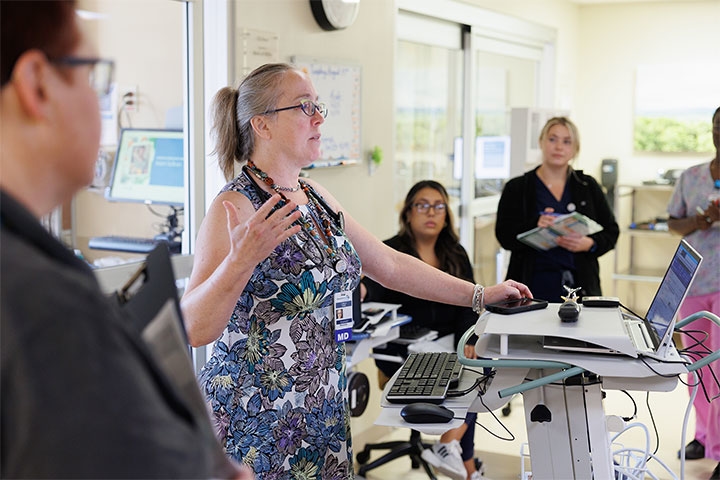
Celebrating 11 Total Years Without Two Prominent Hospital Infections at Howard Memorial
It takes a team to do amazing things together and as the famous philosopher Aristotle once said, “the whole is greater than the sum of its parts,” and that’s exactly true here at Howard Memorial. As of this month, we have surpassed 10 years without a central line-associated bloodstream infection (CLABSI) and one year without a C. Difficile Colitis (C. diff) infection acquired in our hospital. These two accomplishments are a huge milestone for our entire team caring for patients.
CLABSI can occur any time we put in a deep intravenous line into a patient. “Central lines are most commonly placed in urgent situations when the patient is already compromised. This places great pressure on the providers who insert them to be meticulous with their sterile technique,” said Holly Bennett, infection prevention coordinator at Howard Memorial. Central lines are inserted in the neck, upper chest or groin and end at the right atrium of the heart. Due to their location, infections in these lines can be life threatening.
Because of this, we have a highly trained vascular team that helps ensure this process every step of the way is safe, effective, and best for our patients. “We try to replace central lines with peripherally inserted central venous catheters (PICC) or midlines as soon as possible. PICC lines and midlines are smaller, less invasive venous catheters that can stay in place for longer periods of time with a much lower infection rate. Central lines are often lifesaving, and we use them when needed, but I am grateful to the entire PICC and midline team who can safely secure a line that is much less likely to get infected.” Holly went on to say.
This talented team is comprised of Val Takes, Nika Patterson, Amanda Hoyle, Damon Frank-Niesen, Shelli Walker, Lauren Kornegay, Wendy Kyncy, Annikka Ramsey and Katie Wilson. They work in our ICU, Med/Surg and ED departments, and have undergone advanced education and training to be able to provide PICC lines that are cleaner and safer for our patients. “Each of our team members on the vascular team go through extensive training to learn to use an ultrasound, how to understand the device, and how to feed those lines, how to confirm proper placement. They are assessed every step of the way and must be certified to use this technique.” Holly said.
The vascular team looks to keep their skills up and do many of these lines a year ensuring their success each time. This group of nine nurses are even called in on their days off to help place these lines and are a dedicated and invaluable part of our team.
Not only are these nurses important to this process, but so is every single person in our hospital that helps thoroughly care for our patients. “Everyone who touches the line, from the provider who inserts it to each nurse who accesses it for medication administration, to each CNA who performs daily chlorhexidine baths to keep the patients clean – everyone is involved in this success. It is a complete team effort to get to 10 years without a CLABSI in our hospital.”
Not only did we reach 10 years without this infection, but we also reached one year without a C. Difficile Colitis (C. diff) infection acquired in our hospital. This type of infection can happen when a patient with risk factors is exposed to antibiotics and develops an overgrowth of C. difficile in their gut. The colitis associated with C. diff is very unpleasant and can be deadly for fragile patients.
We have an abundance of processes in place to try to ensure C. diff does not spread in our hospital. “In the last year we have been very diligent, screening each person admitted to our hospital for C. diff and assessing whether they may be at risk. If so, we start probiotics for them early which helps give the flora in your gut a chance to remain at healthy levels.” Holly said of the measures being taken.
Our pharmacy team and infectious disease provider also play a huge part in the process as they review each patient on antibiotics for more than 48 hours. They ensure the antibiotic is appropriate to the infection and that the dose and length of treatment is correct. This helps us create a safeguard for patients allowing us to tailor their treatment to just what is needed to bring the patient back to health.
At times, patients are admitted with a C. diff colitis which brings another set of challenges. “If in the event someone comes to us with C. diff, we are diligent in taking precautions that do not allow this infection to spread. Our Environmental Services team (EVS) is trained to deal with C. diff and have a rigorous cleaning process to prevent it’s spread. The EVS team are the unsung heroes of infection prevention.”
Through the hard work of our team of our entire team working together, we can provide the utmost patient-centered care, contributing to the excellence and health of our community.



